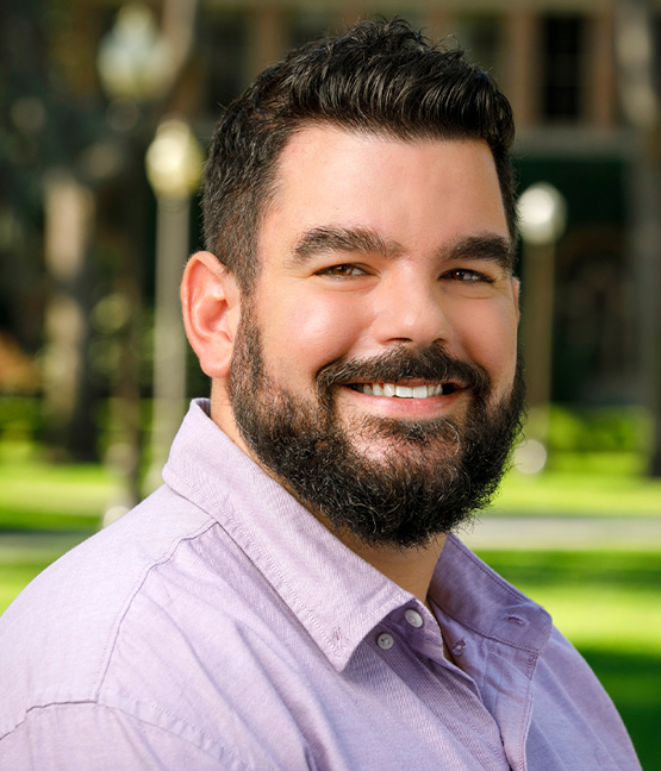
How to Talk with Your Hands
New research led by USC Marshall’s Luca Cascio Rizzo reveals that gestures that visually represent what speakers say help audiences perceive them as more competent and persuasive.
Greek Prime Minister Appoints Marshall Professor to AI Advisory Committee
Greek Prime Minister Appoints Marshall Professor to AI Advisory Committee
Kimon Drakopoulos will serve as a key advisor to Greek Prime Minister Kyriakos Mitsotakis on AI integration policy.

Kimon Drakopoulos
[USC Photo]
Ever since the release of ChatGPT in November 2022, countries around the world have been scrambling to keep up with the revolutionary new technology. From the UNITED STATES to the UNITED NATIONS, governing bodies are recognizing the urgency by forming AI advisory committees to assist with new policy.
Recently, the Greek Prime Minister Kyriakos Mitsotakis followed suit and appointed several high-ranking and respected technologists, researchers, academics, and policy experts to GREECE'S OWN AI ADVISORY COMMITTEE. One of these appointees was USC Marshall Associate Professor of Data Sciences and Operations KIMON DRAKOPOULOS.
“[In 2020], I had a discussion with the Prime Minister and his team about the need to develop a core competency in data science and AI within the Greek government — and how AI would become a central pillar of policy in the years to come,” Drakopoulous said.
The rapid development of generative AI in 2022 and into 2023 prompted the prime minister to create a formal committee centered on the new advancements. In the summer of 2023, the official invitation to join the group arrived on Drakopolous’ desk, and he began additional conversations with Mitsotakis and his team about AI policy.
Drakopoulos has a history of implementing AI algorithms in his home country. At the height of the COVID-19 outbreak in 2020, he and several colleagues developed an algorithm-based system called “EVA” to determine the likelihood that travelers entering Greece would be infected with COVID. According to DATA, Eva identified nearly double the amount of positive cases the government would have otherwise uncovered, while freeing up thousands of valuable tests to be used elsewhere within the country.
According to the Marshall data scientist, his experience with Eva provided him a useful background for his role on the committee.
“I had always been trained to think about the mathematical and technical implementations. When you come to start implementing this, you have to think a lot about transparency, privacy, preservation, and respecting personal data,” Drakopoulos said. “I think that having first-hand experience and exposure to these issues was critical.”
The group will address numerous potential AI applications, including sustainability, international competition, education, and national security. Already the group has delegated responsibilities to members who, in turn, formed bi-weekly subcommittees to address this diverse set of topics. For Drakopoulos’ part, he’ll be balancing his Marshall faculty responsibilities with his committee duties, all while toggling back and forth between Transatlantic time zones.
Sure, change is scary, and humanity has gone through phases of change many times and been successful. I don’t see why this would be so different, assuming that smart people do what they’re supposed to do.
— Kimon Drakopoulos
USC Marshall Associate Professor of Data Sciences and Operations
The prime minister’s decision comes not a moment too soon, especially through the lens of labor. Concerns about generative AI are growing rapidly, as workers worry whether the technology may soon replace them. Drakopoulos doesn’t wonder whether large language models might be an alternative to human workers. He knows they will be, but he believes it’s a part of a progressive pattern in human history.
“Humanity has been evolving for many years, and every disruption has brought replacement of jobs,” Drakopoulos said. “We had exactly this conversation in the pre-industrial and industrial revolution phase…Sure, change is scary, and humanity has gone through phases of change many times and been successful. I don’t see why this would be so different, assuming that smart people do what they’re supposed to do, with regulation that ensures that this development is human-centric.”
By accepting these realities now, Drakopolous may be especially well-suited to address labor concerns through his committee work. In fact, the professor believes bodies like these are vital for the future of his country and nations around the world.
“It’s crucial because of all the conflicts of interest in this new space. There is obviously a tension between privacy and preserving human rights versus effectiveness of these tools,” Drakopoulos said. “Having people with minimal incentives and conflicts of interest advising and giving some guidelines for what the landscape should look like is the healthiest way to go.”
Like with Eva, Drakopoulos sees an opportunity to use new technology to do good. AI may replace jobs, but it may also adapt to innovate the job market and provide opportunities to benefit humanity for countless generations.
“I think there is a lot of potential in fighting climate change implications like flooding and wildfires. I also see a lot of potential in generally improving health services and outcomes. And education. If I had to bet on [areas AI can help Greece], these would be the three,” Drakopoulos said.
Drakopoulos and the other committee members will meet once a month to discuss subcommittee progress and address AI issues as they arise. As the technology races ahead, so will the people of Greece.
RELATED
How to Talk with Your Hands
New research led by USC Marshall’s Luca Cascio Rizzo reveals that gestures that visually represent what speakers say help audiences perceive them as more competent and persuasive.
Cited: Richard Sloan in Bloomberg Tax
Sloan’s research shows that financial auditing and accounting cases usually decline during the first year of a new presidential administration as new division directors are hired.
Interview: Paul Orlando in Beta Boom
Orlando explains how he and the Greif Incubator support founders at USC Marshall.
Marshall Faculty Publications, Awards, and Honors: November 2025
We are proud to highlight the many accomplishments of Marshall’s exceptional faculty recognized for recently accepted and published research and achievements in their field.
Research: Wendy Wood in The Independent
Wood’s research demonstrates that Instagram users who claim to be addicted to the platform actually display few symptoms typically associated with addiction.